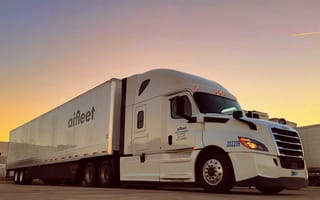
As the U.S. grapples with supply chain bottlenecks, some analysts have said a shortage of truck drivers could be a contributing factor.
The American Trucking Association recently reported the trucking industry is short a record 80,000 drivers — a number it warned could double by 2030. The New York Times warned the trucking shortage could be “the biggest kink in America’s supply chain.”
Aifleet co-founders Marc El Khoury and Mark Farkas believe the problem might not be a lack of drivers — it might be the inefficiencies that limit truckers’ time on the road.
With aifleet, El Khoury and Farkas believe they can make optimize truckers’ workflow — meaning less time waiting and more time driving — by using artificial intelligence to schedule truckers’ routes.
The Austin-based company announced Monday that it has raised $21 million in venture capital, bringing its total funds raised to $24 million. The Series A round was led by Obvious Ventures, with participation from Compound, Ibex Investors and Tom Williams.
Aifleet launched last summer, and the first truck hit the road in September 2020.
The company has 60 employees, 40 of which are drivers. Its operations team is almost entirely based in Austin. The technology team is split between Austin and Hungary, where Farkas lives.

Before starting aifleet, Farkas wrote a software to help trucking companies be more efficient in their workflows.
Farkas discovered, however, that established trucking companies found it difficult to change their processes. He and El Khoury decided they could improve efficiency by running their own trucking company that makes all of its decisions based on a proprietary algorithm and artificial intelligence.
The operations team translates the software’s findings to truck drivers and addresses any issues that truck drivers may encounter.
David Correll, a research scientist at the Massachusetts Institute of Technology’s Center for Transportation and Logistics, recently found that truck drivers drive an average of 6.5 hours per day, even though they are able to drive 11 hours per day under federal safety regulations.
Drivers are often slowed down, El Khoury said, because they are waiting for their truck to get loaded or simply because there’s a gap in their schedule.
“What if I have a driver in Austin today, and I found them a load that picks up from Austin tomorrow? That’s 20 hours where they are just waiting for an appointment,” he said. “This is what our technology does. It reduces that wait so that drivers are maximizing their driving hours.”
Even a small improvement to drivers’ wait times could have a significant impact on the industry. Correll claimed that the driver shortage could be remedied if truck drivers drove an extra 12 minutes per day.
El Khoury told Built In that aifleet’s drivers have a utilization rate of 70 percent to 75 percent, which means they drive more than an hour longer than the average truck driver.
All drivers are full-time employees who receive a guaranteed salary and benefits. On top of the guaranteed salary, drivers receive a percentage based on the revenue generated from the truck. El Khoury said most drivers end up making close to six figures.
“The percentage that we pay them is actually on par with the other trucking companies,” he said. “But the revenue we generate on the truck is so much higher than everybody else, which leads our drivers to make more money than everybody else.”
Additionally, while most trucking companies require drivers to be on the road three weeks at a time, aifleet schedules its drivers for five-day workweeks.
El Khoury said driver satisfaction is important to him, and he has not lost a driver to another trucking company in the year aifleet has been in operation.
With the new funding, aifleet plans to scale its operations. In the next year, El Khoury anticipates hiring 150 to 200 people, including drivers and office employees.
“We are passionate not just about putting a Band-Aid on the problem, but to really try and find real solutions to the pain points in the industry,” El Khoury said. “We believe driver utilization solves so many of the pain points — importantly, the driver shortage issue that everyone is talking about.”




